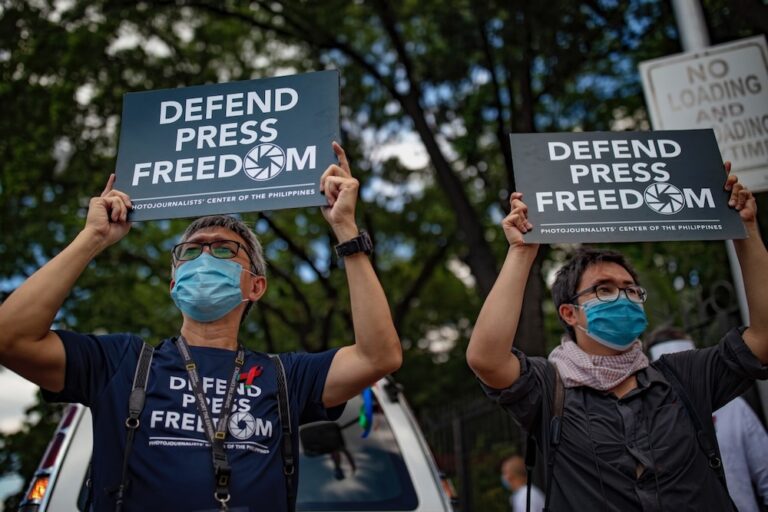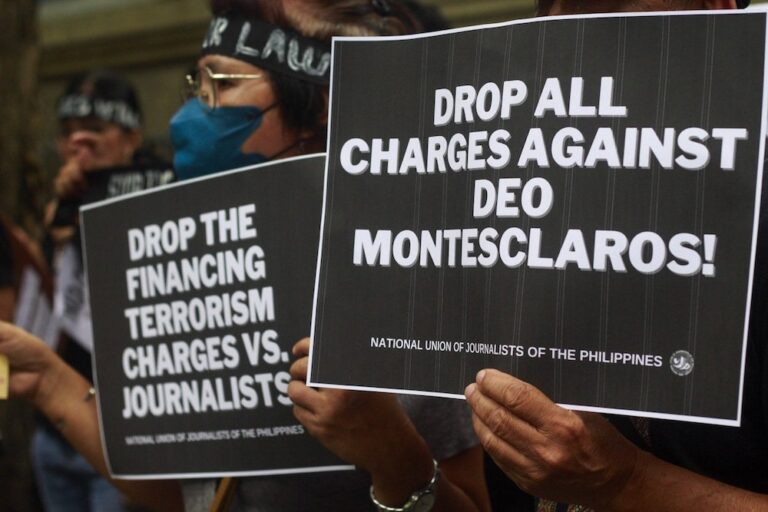Condemning the problem of impunity in the Philippines, 52 IFEX members appeal for justice in the horrible massacre of a reported 28 journalists.
(CMFR/SEAPA/IFEX) – Condemning the problem of impunity in the Philippines, 52 IFEX members appeal for justice in the horrible massacre of a reported 28 journalists:
Attn: Members of the Philippines government, judiciary, police and military
We, the undersigned 52 members of the International Freedom of Expression Exchange (IFEX) network join the people of the Philippines in condemning, in the strongest terms possible, the massacre of at least 57 Filipinos in the southern Philippines.
Any murder is reprehensible, but as freedom of expression and press freedom advocates, we are especially appalled by the most recent media reports that at least 28 of those killed in the province of Maguindanao on 23 November 2009 were journalists.
IFEX members monitor attacks on journalists and media on a daily basis, throughout the world. Our members call attention to various forms of violence and threats not just to journalists, but to the larger environments in which independent media must survive. And still, the massacre of journalists in Maguindanao staggers our community. It is a crime of such scale and horror that is incomparable to anything we have seen.
Initial reports from Maguindanao point to the massacre being politically motivated, specifically tied to a rivalry between two entrenched political clans. Among those reported killed, after all, was the wife of one clan leader who was hoping to make a run against the incumbent governor.
Whatever the motives, the Philippine government must work swiftly and with urgency to bring the perpetrators of this heinous crime to justice. Beyond what is attributed to election-related violence and the reality of “warlordism” in the Philippines, we urge the Philippine government to address the larger problem of impunity that festers in Philippine society. It is this environment, where violence and crime go unpunished, that leads to tragedies such as what befell our colleagues in Maguindanao. It is the same toxic environment for which the government itself must be held accountable and take responsibility.
Our members, the Manila-based Center for Media Freedom and Responsibility (CMFR), and the Bangkok-based regional Southeast Asian Press Alliance (SEAPA), of which CMFR is one of the founding members, note that the 23 November killings have increased the number of Filipino journalists killed in the line of duty this year from 3 to 31. That adds to the 81 journalists killed in the line of duty in the Philippines since 1986.
Clearly, the Maguindanao tragedy goes beyond one day’s carnage. It is rooted in impunity that begets more violence, and encourages more (and more deadly) intolerance for dissent and independent discourse. It is the same climate of impunity that our members, for years now, have been saying is at the root of the high rate of journalist killings in the Philippines.
Given these realities, we call on the Philippine government to do all that it must to halt the violence and bring the murderers to justice, as swiftly as possible.
Finally, we join the CMFR in rejecting any reaction from the government that would further limit or block independent media access to the situation in Maguindanao. Proposals to place the entire province under emergency rule, and therefore under military control, will likely restrict information where information and truth is precisely needed, and further discredit the sincerity of the government to get to the bottom of this tragedy.
We support our colleagues in the Philippines in their call for an independent fact-finding mission to Maguindanao, and stand ready to help in any way that we can. We urge caution given the volatile situation in Maguindanao, but at the same time call on the Philippine government, the police and military, to be accountable for the security and safety of any such missions in the coming days.
Signed,


